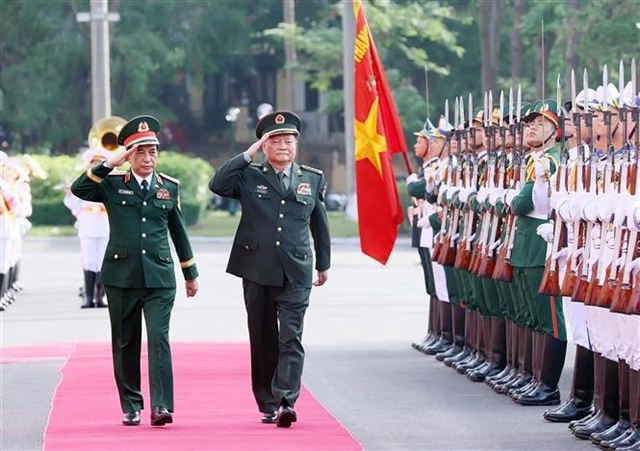 Politics & Law
Politics & Law

 |
| Vietnamese Ambassador to China Phạm Sao Mai. — VNA/VNS Photo |
HÀ NỘI — Prime Minister Phạm Minh Chính’s upcoming visit to China carries major diplomatic and strategic importance, marking his attendance at the 8th Greater Mekong Subregion (GMS) Summit as well as visits to Yunnan Province and Chongqing City.
Vietnamese Ambassador to China Phạm Sao Mai at the interview with Vietnam News Agency said the trip has several key implications.
Firstly, in light of the increasingly complex international and regional landscape, PM Chính’s presence at the 8th GMS Summit, alongside the Vietnamese delegation, reinforces Việt Nam’s independent, self-reliant, peaceful and multilateral foreign policy, showcasing its proactive and effective engagement in international integration and multilateral diplomacy.
Secondly, the Government leader’s participation reaffirms Việt Nam's commitment to sub-regional cooperation mechanisms, including the GMS. Initiatives proposed by Việt Nam at the summit are expected to strengthen the GMS’s core areas of collaboration, such as infrastructure connectivity, climate change adaptation and sustainable water management.
The third objective underscores the shared interests and friendship between Việt Nam and other GMS member countries along the Mekong River. The Vietnamese delegation’s presence will help fortify relationships between Vietnamese localities and neighbouring countries, Mai added, noting that geographical proximity and convenient transport links make local cooperation a vital element of the GMS partnership.
During his stay in China, PM Chính is also expected to engage in key activities in Yunnan Province and Chongqing City, Mai shared, underscoring the continuity of high-level exchanges between the two countries.
By fostering cooperation between localities on both sides, this mission aims to boost the effectiveness and quality of collaborative efforts, ultimately benefiting people in both nations. This comes as the two countries approach the 75th anniversary of Việt Nam-China diplomatic relations and the 'Việt Nam-China People-to-People Exchange Year' in 2025.
Mai further elaborated that PM Chính, along with GMS leaders, is expected to adopt the summit’s Joint Statement and the GMS Innovation Development Strategy 2030, which will recognise six key documents on investment, environment and climate change, digitalisation, gender equality, health and the digitalisation of trade.
These outcomes will foster new momentum for sub-regional cooperation and for the GMS partnership in particular. The strategic directions set by the GMS Summit are expected to contribute effectively to ASEAN community-building and to shaping a regional structure with ASEAN at its centre, Mai said.
In terms of bilateral engagement, the trip is anticipated to deliver practical and concrete outcomes. It will serve as an opportunity to implement the consensus reached by high-level leaders during General Secretary Tô Lâm's official visit to China in August 2024, with Yunnan Province, Chongqing City and Vietnamese localities encouraged to strengthen mutual understanding and collaborative mechanisms to tap into each other's strengths, the diplomat explained.
Additionally, this mission will help prioritise actions to bolster cooperation in economy, trade, investment, infrastructure, culture, education, tourism and people-to-people exchanges. It will further allow both sides to promote public awareness of the traditional friendship and promising cooperative future between the two countries, reinforcing the Việt Nam-China Comprehensive Strategic Cooperative Partnership and building a stronger foundation for a shared future.
In discussing the cooperation potential of Yunnan Province and Chongqing City with Việt Nam, Mai highlighted Yunnan’s geographic proximity to Việt Nam’s Northwest provinces, positioning it as a gateway linking China with South and Southeast Asia. This proximity has facilitated robust exchanges and cooperation between Yunnan and Vietnamese localities, with initiatives such as annual meetings between regional Party Secretaries and the Economic Corridor Cooperation Conference, which includes major cities and provinces in Việt Nam and Yunnan. These collaborative efforts have yielded significant outcomes in border management, transportation connectivity, port development, and cultural and tourism exchanges.
In trade, Yunnan and Vietnamese localities have facilitated customs clearance and trade operations, leading to a 30.31 per cent increase in bilateral trade to US$2.09 billion in the first eight months of 2024.
Looking ahead, Yunnan and Vietnamese localities plan to expand cooperation in delegation exchanges, economy, trade, investment, border management, transportation connectivity and tourism, according to the ambassador. Shared cultural ties and historical friendships further support humanistic exchanges, fostering greater understanding and friendship, particularly in border regions.
Meanwhile, Chongqing City serves as a major economic hub in western China, with strengths in independent governance, economic openness, transportation and logistics and as a central link for the international rail route from China to Europe.
With a prominent industrial base, particularly in car and electronic manufacturing, Chongqing also boasts rich tourism resources. Việt Nam and Chongqing share a historic bond, with ties to President Hồ Chí Minh’s revolutionary activities in the city.
Trade cooperation between the two has grown significantly, with Việt Nam being Chongqing’s largest ASEAN trading partner since 2019. Bilateral trade reached $3.03 billion in the first seven months of 2024, with Việt Nam’s exports to Chongqing totalling $1.88 billion.
Investment cooperation has also deepened, with Việt Nam having five projects in Chongqing worth $8.1 million, while Chongqing has invested in 22 projects in Việt Nam, totalling $296 million, Mai explained.
Mai emphasised that both Việt Nam and Chongqing have substantial potential to strengthen cooperation further.
Areas for growth include expanding local exchanges, enhancing strategic connectivity and infrastructure, boosting bilateral trade in key sectors, attracting high-tech industrial investment in areas such as green and digital transformation and deepening people-to-people exchanges.
Additionally, the two sides are exploring new flight routes between Chongqing and Vietnamese localities to capitalise on tourism potential, the ambassador said. —VNS




